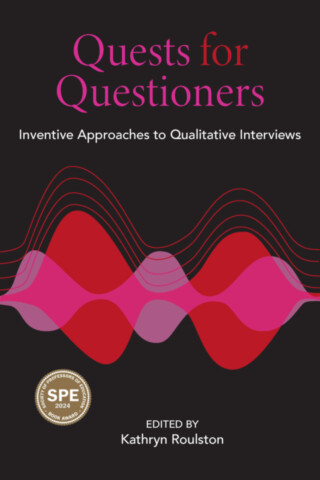
Library E-Books
We are signed up with aggregators who resell networkable e-book editions of our titles to academic libraries. These editions, priced at par with simultaneous hardcover editions of our titles, are not available direct from Stylus.
These aggregators offer a variety of plans to libraries, such as simultaneous access by multiple library patrons, and access to portions of titles at a fraction of list price under what is commonly referred to as a "patron-driven demand" model.
E-books are now distributed via VitalSource
VitalSource offer a more seamless way to access the ebook, and add some great new features including text-to-voice. You own your ebook for life, it is simply hosted on the vendor website, working much like Kindle and Nook. Click here to see more detailed information on this process.
Language: English
2024 AESA Critics' Choice Award Winner
2024 SPE Outstanding Book Award Winner
This edited book presents a range of quests for those who want to learn from others through asking questions in research interviews and conversations and attending to the more-than-human aspects of the world. Authors in this book explore how to talk to people in ways that are responsive to cultural contexts and the challenges faced by people in everyday life, how to think with concepts drawn from an array of theories, including Karen Barad’s concept of “intra-action,” Rosi Braidotti’s work on “cartographies,” and Gilles Deleuze and Félix Guattari’s concepts of the “fold” and “assemblage.” Authors discuss a rich array of interview practices used by contemporary scholars—including, how to
a. elicit verbal accounts from participants in culturally responsive ways;
b. think with theory in relation to the use of interview methods; and
c. integrate object, graphic, and photo elicitation methods and mobile and walking methods in research.
The book is designed to provoke and inspire readers’ creativity to take risks and integrate different approaches to doing interviews in their research—in other words, to undertake methodological quests to experiment with the art of asking questions. Understanding the breadth of practices entailed in qualitative interview research can invigorate any researcher’s practice. This volume seeks to encourage researchers to design studies that account for how they interact with others in culturally responsive ways; to consider how they can draw on theoretical concepts to re-think, re-theorize, and question conventional interview practices; and to re-imagine the generation of interview accounts using other ways of knowing, including visual, sensory, and mobile methods.
Perfect for courses such as: Introductory Research Methods │Introductory Qualitative Methods │Qualitative Research Design │Interview Research │Qualitative Data Collection
List of Figures and Text Boxes
Introduction
Part I: Being Culturally Responsive in Interview Research
One: Culturally Responsive Interviews: The Negotiation of Cultures
Lorien S. Jordan
Two: Beyond Qualitative Interviews: Toward Synergistic Conversations as Relational and Nation Building
Emma Elliott and Timothy San Pedro
Three: Culturally Responsive Focus Groups
Jori N. Hall and Joseph-Emery Lyvan Kouaho
Four: Recruiting For and Conducting Virtual Focus Groups and Interviews With Low-Income Populations During the COVID-19 Pandemic
Brigette A. Herron, Darci Bell, and Jung Sun Lee
Part II: Being Inventive in Theorizing Interviews
Five: Cartographic Accounts: Qualitatively Mapping With Braidotti
Maureen A. Flint and Morgan P. Tate
Six: Intra-Action is For Everybody! (Re)Thinking the Qualitative Interview
Travis M. Marn and Jennifer R. Wolgemuth
Seven: Past, Present, Futures of Assembling Object-Interviews
Susan Naomi Nordstrom
Part III: Being Inventive in Eliciting Interview Accounts
Eight: Object Lessons: Considering Object-Interviews and Narrative Representation in Qualitative Research
Janie Copple
Nine: Experience in the Abstract: Exploring the Potential of Graphic Elicitation
Alison Bravington
Ten: Mobile Methods, Go-Alongs, and Walking Interviews
Kathryn Roulston and Maureen A. Flint
Eleven: Photo Elicitation With Native STEM Students and Professionals
Nuria Jaumot-Pascual, Tiffany Smith, Maria Ong, and Kathy DeerInWater
About the Authors
Acknowledgments
Index
“Quests for Questioners: Inventive Approaches to Qualitative Interviews is an invigorating collection of contributions from diverse perspectives about innovative understandings of interview practices. Whether you’re experienced or new to research, this accessible book will stimulate you to think ‘outside the box’ conceptually and culturally, and to experiment with moving beyond the standard question-answer talk. It’s a valuable resource that should be on every qualitative research reading list.”
Rosalind Edwards, Professor of Sociology, University of Southampton, UK
“Kathryn Roulston’s edited book is an important, timely, thoughtful, and accessible collection. As someone who designs, conducts, and teaches interview-based qualitative research, I appreciate how useful that the range of discussions here are for scholars across disciplines and experience levels, as the authors consider a range of methodologies, including culturally responsive focus groups, object-based interviews, photo and graphic elicitations, and place-based interviewing. The variety of engagements with interviewing offered here will be applicable across courses, contexts, research projects, and readers’ needs and interests.”
Stephanie A. Shelton, Associate Professor of Qualitative Research, The University of Alabama, USA
“In Roulston’s edited volume, Quests for Questioners: Inventive Approaches to Qualitative Interviews, readers are introduced to innovative approaches to qualitative interviewing, as well as foundational theoretical and practical considerations for this approach to data generation. The volume offers new insights about culturally responsive approaches to interviewing, as well as rich discussions on how to engage with theory when re-conceptualizing interviewing practices. From the use of graphics to mobile methods to photo elicitation, this volume maps out new possibilities for what remains the most common approach to generating qualitative data. Indeed, this volume is a key and essential resource for qualitative inquirers seeking to deepen and expand their qualitative interviewing practices.”
Jessica Nina Lester, Professor of Qualitative Research, Indiana University, Bloomington



